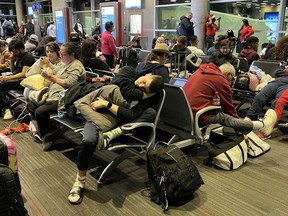World
Trump Administration Cancels Airline Compensation Proposal

The U.S. Department of Transportation under President Donald Trump has officially withdrawn a proposal aimed at requiring airlines to compensate passengers for delays and cancellations caused by the airlines themselves. This decision, announced on Thursday, marks a significant shift away from consumer protection efforts initiated during the Biden administration.
The original proposal, introduced for public comment in December 2022, called for airlines to provide compensation ranging from $200 to $775 in cash to affected passengers. Additionally, it would have obligated airlines to cover expenses for meals, hotels, and transportation related to disruptions within the airline’s control, such as mechanical failures. The proposal also aimed to ensure that passengers would be rebooked on the next available flight without incurring extra charges.
In the document announcing the proposal’s withdrawal, officials stated that this action aligns with the current Department and administration priorities. Under President Biden and Transportation Secretary Pete Buttigieg, the Department had sought to enhance consumer protections by streamlining refund processes and promoting transparency regarding airline fees. Buttigieg previously expressed a desire to create a significant expansion of passenger rights, declaring, “I really want this to be known as the period when we did the biggest expansion in passenger rights since deregulation.”
In contrast, Trump has concentrated much of his second term on a deregulatory agenda, reversing policies established by the previous administration. The industry trade group Airlines for America has been vocal in its opposition to many of the Biden administration’s regulatory efforts, labeling them as “shortsighted” and suggesting they would lead to increased costs and fewer choices for consumers. In response to the decision to withdraw the compensation proposal, the group expressed optimism about the Department’s review of what they termed “unnecessary and burdensome regulations.”
While some airlines do provide food, lodging, or transportation vouchers for canceled or delayed flights, none of the largest U.S. airlines currently offer cash compensation for cancellations. Only four airlines provide credit or travel vouchers as a form of compensation. The Biden-era proposal aimed to formalize these practices and create consumer protections similar to those established in the United Kingdom and across European Union member states.
Transportation Secretary Buttigieg took to social media to voice his disappointment over the cancellation of the compensation proposal. He criticized the appointment of an airline lobbyist, Sean P. Duffy, to lead the Department of Transportation, referencing Duffy’s past association with the Partnership for Open and Fair Skies, a coalition representing U.S. airlines.
The withdrawal of this consumer protection proposal underscores the ongoing tension between regulatory efforts aimed at consumer rights and the push for deregulation within the airline industry. As the administration shifts its focus, the implications for passengers remain to be seen, with many advocating for stronger protections against airline disruptions.
-

 Science3 months ago
Science3 months agoToyoake City Proposes Daily Two-Hour Smartphone Use Limit
-

 Top Stories3 months ago
Top Stories3 months agoPedestrian Fatally Injured in Esquimalt Collision on August 14
-

 Health3 months ago
Health3 months agoB.C. Review Reveals Urgent Need for Rare-Disease Drug Reforms
-

 Technology3 months ago
Technology3 months agoDark Adventure Game “Bye Sweet Carole” Set for October Release
-

 World3 months ago
World3 months agoJimmy Lai’s Defense Challenges Charges Under National Security Law
-

 Lifestyle3 months ago
Lifestyle3 months agoVictoria’s Pop-Up Shop Shines Light on B.C.’s Wolf Cull
-

 Technology3 months ago
Technology3 months agoKonami Revives Iconic Metal Gear Solid Delta Ahead of Release
-

 Technology3 months ago
Technology3 months agoApple Expands Self-Service Repair Program to Canada
-

 Technology3 months ago
Technology3 months agoSnapmaker U1 Color 3D Printer Redefines Speed and Sustainability
-

 Technology3 months ago
Technology3 months agoAION Folding Knife: Redefining EDC Design with Premium Materials
-

 Business3 months ago
Business3 months agoGordon Murray Automotive Unveils S1 LM and Le Mans GTR at Monterey
-

 Technology3 months ago
Technology3 months agoSolve Today’s Wordle Challenge: Hints and Answer for August 19









